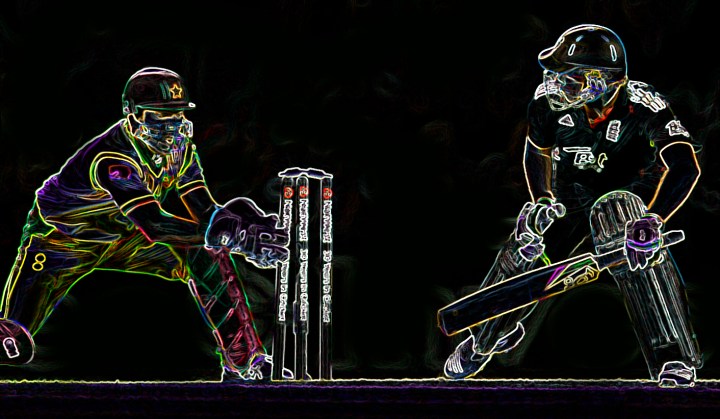Maverick Life, Sport
‘Love at first listen’ – Dean du Plessis’ passion for cricket

He might not have sight, but that doesn’t stop Dean du Plessis from having vision and heart. Like so many people across the world, he loves cricket and even commentates on it from time to time. But he’s never seen a game in his life, not in the conventional sense anyway. By ANT SIMS.
The next time you are watching a cricket match, try for a minute or two to give a ball-by-ball commentary on the events unfolding on your television screen. Try to describe, with acute precision, which delivery the bowler delivered and how the batsman responded. Then, just for a few balls, close your eyes and try doing it again. Sounds impossible, doesn’t it? It probably is, unless your name is Dean du Plessis.
He’s been blind all his life. In fact, when he was born with tumours on both his retinas, he was given just a few months to live but, as with so many other things in his life, he has defied those odds. He’s never known what it’s like to have sight, but that’s not stopped Du Plessis from having vision and insight. When he’s not writing about cricket or listening to it, he’s commentating on it.
Du Plessis recalls his first encounter with the game in great detail.
“I’d switched the radio on and I’d heard this wonderful, enchanting noise. The click of the leather ball meeting with the wooden bat and the roar of 80,000 people every single time the ball thudded as it hit the turf. My brother told me it was cricket and it was love at first listen, but what really put the cherry on top for me was when Zimbabwe beat England in the 1992 World Cup,” Du Plessis recalls.
He can tell just about everything from listening to stump microphones. Some bowlers drag their feet a bit more than others, others give a certain type of grunt when they release the ball. He knows the little grunts and mumbles from some of the world’s most prominent players.
“When Marcus Trescothick used to open the batting, he would just call for a run by saying ‘run’ and Andrew Strauss calls for a run by saying ‘yeah, come on, come on’. I can also tell by grunts what kind of shots players are playing. Both Graeme Smith and Kevin Pietersen grunt quite a bit when they play the hook or the pull shot,” he says.
Du Plessis can also tell the type of shot being played by listening to the sound the bat makes on the turf.
Like most youngsters, once the love of the game bites you, it becomes infectious and spreads rapidly through every facet of your life. While he never got to play proper blind cricket, Du Plessis recalls fond memories of playing back-yard cricket with his brother, Gary.
“Gary taught me everything I know about cricket. We had some great games in the back yard, but I always had to be South Africa and he always got to be Zimbabwe,” he laughs.
“I’ll be honest, though, I wasn’t much good, so even if I got to play blind cricket, I don’t think I’d have gotten very far.”
Du Plessis was given his first break during a triangular series in Zimbabwe. He’d walked up to Neil Manthorp and started talking to him. Manthorp invited him for a stint of commentary, and Du Plessis in all his perceptive glory went so far as to correct his new-found friend on two bowlers. Things progressed from there and he’s often found doing commentary stints when Zimbabwe are playing, but it’s all done on a volunteer basis and he’s never been paid for any work.
“It’s a bit hurtful to go out there and give it your all and then not get paid. A bit like a batsman who is always scoring runs and not getting picked, I guess. But, in the same breath, I am really grateful for all the opportunities I get. It’s lovely to have people come up to me in the supermarket and talk to me, because I know it’s those people who can make or break my career. I am very lucky to have the opportunity to do what I do,” says du Plessis.
Any cricket fan will tell you that, when the atmosphere is tangible, you feel the game flowing through your veins. Every ritualistic change of sides at the end of an over seems like an elegant ballet, scripted, perfect. When the crack of an off-stump, followed by the visceral roar from a bowler engulfs you and commands every single hair on your body to stand up, you’re hooked. For Du Plessis, it’s something he experiences every game.
“I do think I am quite in tune with the game. I can tell a lot about how the match is going simply by listening to the ground and by getting a sense of the atmosphere,” he says.
He recalls one of his favourite memories – feeling the footmarks of bowlers on the pitch after Zimbabwe had played Pakistan in a Test match.
“It’s not often that I get to do something like that, but it was quite amazing to feel the footmarks which players had been bowling into for four days. I obviously didn’t know whose footmarks they were, but it was a really unique experience.”
For most, cricket is a game which requires all your senses. For Du Plessis, it requires intuition. For all of us, his story serves as the simple reminder that we are only limited by our own excuses and for cricket lovers, he’s the poster boy for the barriers the game has the ability to abolish. DM
Photo by Reuters


















 Become an Insider
Become an Insider